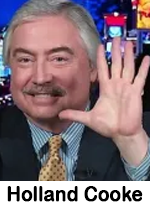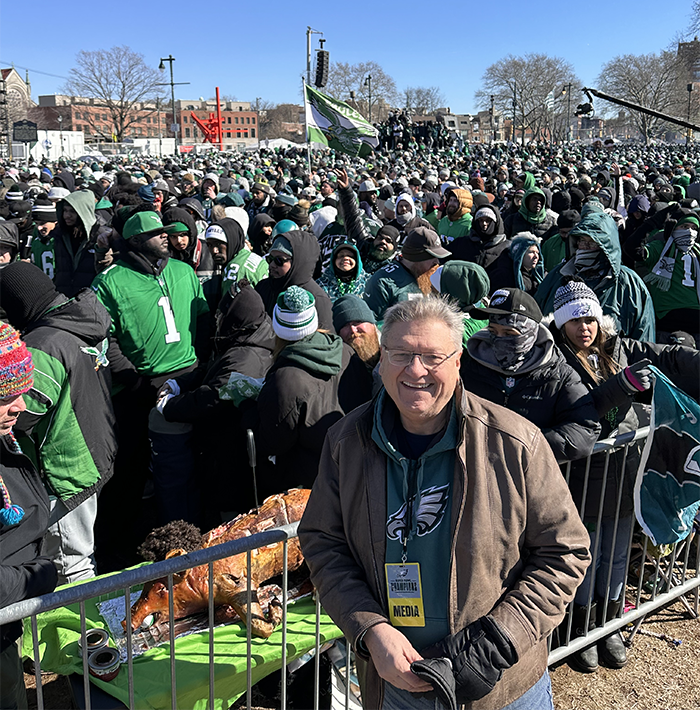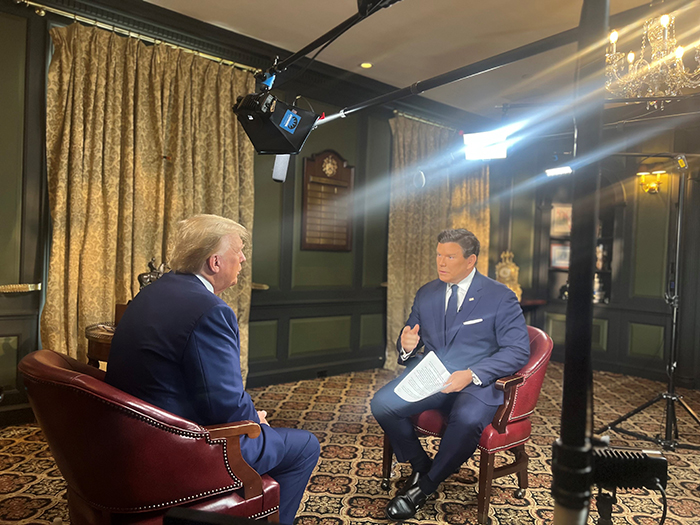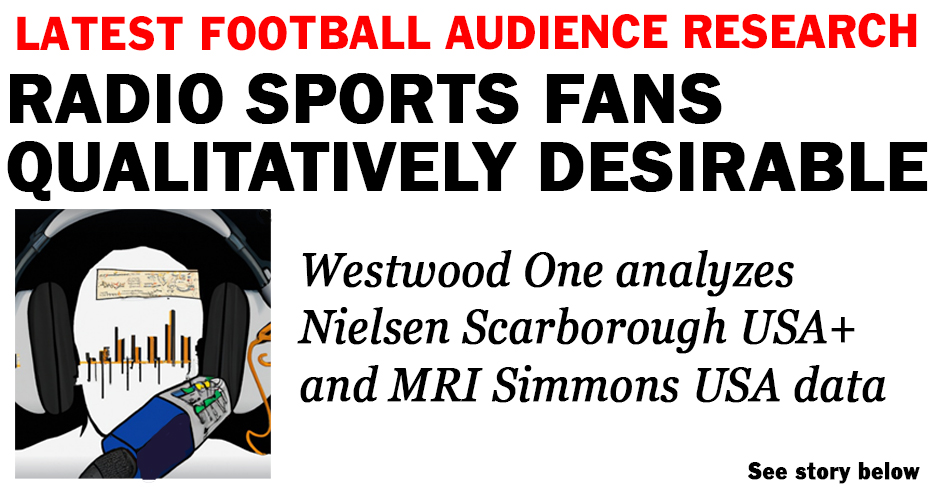By Holland Cooke
Consultant
 Now that every single thing is a political argument, the angry social media conversation about Taylor Swift is unsurprising. And with the Super Bowl looming, the decibel level amps-up.
Now that every single thing is a political argument, the angry social media conversation about Taylor Swift is unsurprising. And with the Super Bowl looming, the decibel level amps-up.
So, kudos to SiriusXM and CNN host Michael Smerconish. I’ve previously cited him here as technique worth emulating when it comes to:
– Polling the audience on an ongoing basis (a sponsored feature on smart radio stations)
– Leveraging social media to give audience ownership of the show; and
– Genuine curiosity. His centrist approach earns him scorn from both sides in this Cold Civil War we’re living through. I can relate. When I managed WTOP, Washington, the quickest way to make the phone explode was to announce a crowd estimate for an abortion rally. Both sides jammed the lines to damn the number.
This preposterous Swift kerfuffle had been all heat until Smerconish shed light on it this past weekend. Noting rumors shared by FOX News that she would photobomb the Super Bowl with a Joe Biden endorsement, his poll question was “Could Taylor Swift determine the outcome of the presidential election?”

Just now, you answered that question in your own mind. But – for our purposes – the more useful approach is to consider information Smerconish curated unfiltered by personal politics:
– Swift has 279 million Instagram followers
– She has (so far) sold 4.35 million pricey tickets for The Eras Tour. Its “record-shattering revenue” (so far) is $1 billion+
– $200 million (so far) in tour merchandise. Her gray $45 T-shirt is now sold-out in all but 3XL and 4XL.
– 26 billion+ Spotify streams in 2023.
– SSRS polling: 59% of USA adults identify as Swift fans, 63% of women; and her fans are evenly divided 50/50 between Democrat or Dem-leaning and Republican or GOP-leaning.
– On her urging, several hundred thousand Americans younger than 25 have registered to vote.
Add it all up? “Taylor knows your social media interactions, where you saw her on tour, how much merch’ you’ve bought from her website, she knows the size of your T-shirt, the number of downloads you’ve made. We’re embarking on an election cycle which will be (a) the most expensive in history, and (b) will see much of the money spent on ‘micro-targeting,’ the use of online data to tailor – pun intended – advertising messages to individuals based on the identification of recipients’ personal vulnerabilities and interests. In order to target effectively, data is essential. And Taylor’s got lots and lots of it, and on a demographic that is exactly what the Biden team needs the most: disproportionally female, young, and passionate. With truly the touch of a button Taylor Swift is uniquely situated to use the data at her disposal to impact the presidential race.”
Leave it to your nerdy consultant to ask: Are WE using OUR listener data to OUR benefit?
Bigger-picture issues:
– Privacy: We have all volunteered LOTS of information about ourselves. Look what pops up in your email and your social media.
– Vulnerability of the Electoral vote process: The last two Republican presidents took office after losing the popular vote. Taylor Swift is my coastal Rhode Island neighbor, and if she votes here, neither of us matter. Our state has four electoral votes. Just 40 thousand-some popular votes in three key states gave Biden his 2020 win.
– Tone: The measurable appeal of Swift’s sunny disposition vs. “I am your retribution.”
Good for us. News/talk radio is in the suspense business. “What JUST happened??? What happens NEXT???” So, we should wish Nikki Haley well.
Inquisitive Smerconish sounds like dispassionate Mr. Spock: “What [Swift detractors on the right] should be worried about is her data.”
Holland Cooke (HollandCooke.com) is a consultant working at the intersection of broadcasting and the Internet. He is the author of “Close Like Crazy: Local Direct Leads, Pitches & Specs That Earned the Benjamins” and “Confidential: Negotiation Checklist for Weekend Talk Radio.” Follow HC on Twitter @HollandCooke and connect on LinkedIn.
Share this with your network
 Super Bowl Week coverage that will emanate live from live Radio Row in San Francisco culminating with the official local call of the game. Station PD Rick Radzik says, “After an eight-year absence, ‘The Sports Hub’ is thrilled to celebrate the Patriots’ return to the big game with fans across the region. We’ll once again deliver the best coverage all week, capped by the best call of the game on Sunday. Pats Nation will be well represented in San Francisco, and we can’t wait to be part of it.”
Super Bowl Week coverage that will emanate live from live Radio Row in San Francisco culminating with the official local call of the game. Station PD Rick Radzik says, “After an eight-year absence, ‘The Sports Hub’ is thrilled to celebrate the Patriots’ return to the big game with fans across the region. We’ll once again deliver the best coverage all week, capped by the best call of the game on Sunday. Pats Nation will be well represented in San Francisco, and we can’t wait to be part of it.”




 December 30 to January 19 and aims to leverage its on-air reach to help a local business brand, rebuild, or grow. Audacy Chicago VP of sports programming Mitch Rosen says, “This contest and promotion embodies everything ‘The Score’ truly stands for: live, local sports and, most importantly, the community. From the hundreds of entries we received, we know how important it is for the community to support local businesses. We’re excited to spotlight Heritage and share their story to help them grow and expand their business. Given the massive audience the game attracts on ‘The Score,’ our goal is to leverage every platform to maximize exposure for the restaurant.”
December 30 to January 19 and aims to leverage its on-air reach to help a local business brand, rebuild, or grow. Audacy Chicago VP of sports programming Mitch Rosen says, “This contest and promotion embodies everything ‘The Score’ truly stands for: live, local sports and, most importantly, the community. From the hundreds of entries we received, we know how important it is for the community to support local businesses. We’re excited to spotlight Heritage and share their story to help them grow and expand their business. Given the massive audience the game attracts on ‘The Score,’ our goal is to leverage every platform to maximize exposure for the restaurant.” Now that every single thing is a political argument, the angry social media conversation about Taylor Swift is unsurprising. And with the Super Bowl looming, the decibel level amps-up.
Now that every single thing is a political argument, the angry social media conversation about Taylor Swift is unsurprising. And with the Super Bowl looming, the decibel level amps-up.
 duties for the 13th straight year, and Kurt Warner returns for the fifth consecutive year as lead analyst. Gene Steratore will also join the radio broadcast booth. For the fourth time, Laura Okmin will patrol the sidelines, along with former defensive lineman Mike Golic, who returns for his second Super Bowl with Westwood One’s broadcast crew. Scott Graham anchors the pregame, halftime, and postgame shows and Ryan Harris provides pregame, halftime, and postgame analysis. Gameday coverage begins at 2:00 pm ET with “Super Bowl Preview,” co-hosted by Scott Graham, Mike Golic, and Kurt Warner, followed by “Super Bowl Insider” at 3:00 p.m. ET with Scott Graham, Jason McCourty, and Ian Rapoport.
duties for the 13th straight year, and Kurt Warner returns for the fifth consecutive year as lead analyst. Gene Steratore will also join the radio broadcast booth. For the fourth time, Laura Okmin will patrol the sidelines, along with former defensive lineman Mike Golic, who returns for his second Super Bowl with Westwood One’s broadcast crew. Scott Graham anchors the pregame, halftime, and postgame shows and Ryan Harris provides pregame, halftime, and postgame analysis. Gameday coverage begins at 2:00 pm ET with “Super Bowl Preview,” co-hosted by Scott Graham, Mike Golic, and Kurt Warner, followed by “Super Bowl Insider” at 3:00 p.m. ET with Scott Graham, Jason McCourty, and Ian Rapoport.
 NFL, and this year’s Super Bowl coverage marks the 50th time that the network will broadcast the game. Some of the key takeaways from this study are: 1) NFL postseason AM/FM radio listeners are a desirable group of consumers: They are more likely to work full time and have higher disposable incomes compared to NFL postseason TV viewers; 2) The NFL postseason AM/FM radio audience is more engaged with sports: MRI Simmons finds NFL postseason AM/FM radio listeners attend more sporting events, seek out sports information on their phones more often, and play more fantasy sports than NFL postseason TV watchers. The higher levels of engagement translate into greater advertising effectiveness; and 3) NFL postseason AM/FM radio listeners are more likely to make purchases across key consumer categories: Compared to the NFL postseason TV audience, AM/FM radio delivers more consumers who are likely to buy a new or used vehicle, start a new business, or hire a financial advisor. You can see the complete report
NFL, and this year’s Super Bowl coverage marks the 50th time that the network will broadcast the game. Some of the key takeaways from this study are: 1) NFL postseason AM/FM radio listeners are a desirable group of consumers: They are more likely to work full time and have higher disposable incomes compared to NFL postseason TV viewers; 2) The NFL postseason AM/FM radio audience is more engaged with sports: MRI Simmons finds NFL postseason AM/FM radio listeners attend more sporting events, seek out sports information on their phones more often, and play more fantasy sports than NFL postseason TV watchers. The higher levels of engagement translate into greater advertising effectiveness; and 3) NFL postseason AM/FM radio listeners are more likely to make purchases across key consumer categories: Compared to the NFL postseason TV audience, AM/FM radio delivers more consumers who are likely to buy a new or used vehicle, start a new business, or hire a financial advisor. You can see the complete report